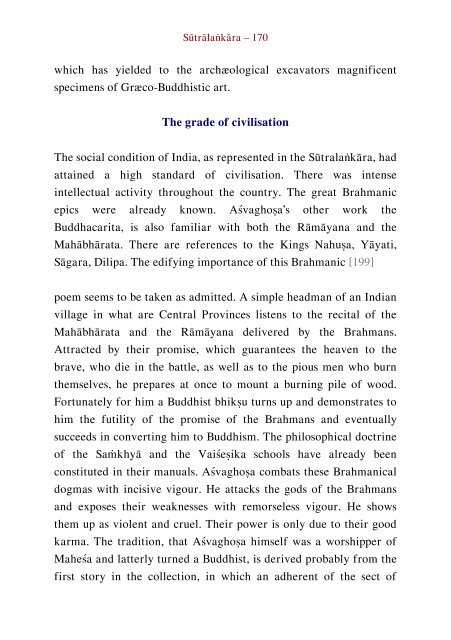Literary History of Sanskrit Buddhism
A study by J. K. Nariman of Sanskrit Buddhism from the Early Buddhist Tradition up to the Mahayana texts proper.
A study by J. K. Nariman of Sanskrit Buddhism from the Early Buddhist Tradition up to the Mahayana texts proper.
Create successful ePaper yourself
Turn your PDF publications into a flip-book with our unique Google optimized e-Paper software.
Sūtrālaṅkāra – 170<br />
which has yielded to the archæological excavators magnificent<br />
specimens <strong>of</strong> Græco-Buddhistic art.<br />
The grade <strong>of</strong> civilisation<br />
The social condition <strong>of</strong> India, as represented in the Sūtralaṅkāra, had<br />
attained a high standard <strong>of</strong> civilisation. There was intense<br />
intellectual activity throughout the country. The great Brahmanic<br />
epics were already known. Aśvaghoṣa’s other work the<br />
Buddhacarita, is also familiar with both the Rāmāyana and the<br />
Mahābhārata. There are references to the Kings Nahuṣa, Yāyati,<br />
Sāgara, Dilipa. The edifying importance <strong>of</strong> this Brahmanic [199]<br />
poem seems to be taken as admitted. A simple headman <strong>of</strong> an Indian<br />
village in what are Central Provinces listens to the recital <strong>of</strong> the<br />
Mahābhārata and the Rāmāyana delivered by the Brahmans.<br />
Attracted by their promise, which guarantees the heaven to the<br />
brave, who die in the battle, as well as to the pious men who burn<br />
themselves, he prepares at once to mount a burning pile <strong>of</strong> wood.<br />
Fortunately for him a Buddhist bhikṣu turns up and demonstrates to<br />
him the futility <strong>of</strong> the promise <strong>of</strong> the Brahmans and eventually<br />
succeeds in converting him to <strong>Buddhism</strong>. The philosophical doctrine<br />
<strong>of</strong> the Saṁkhyā and the Vaiśeṣika schools have already been<br />
constituted in their manuals. Aśvaghoṣa combats these Brahmanical<br />
dogmas with incisive vigour. He attacks the gods <strong>of</strong> the Brahmans<br />
and exposes their weaknesses with remorseless vigour. He shows<br />
them up as violent and cruel. Their power is only due to their good<br />
karma. The tradition, that Aśvaghoṣa himself was a worshipper <strong>of</strong><br />
Maheśa and latterly turned a Buddhist, is derived probably from the<br />
first story in the collection, in which an adherent <strong>of</strong> the sect <strong>of</strong>


















